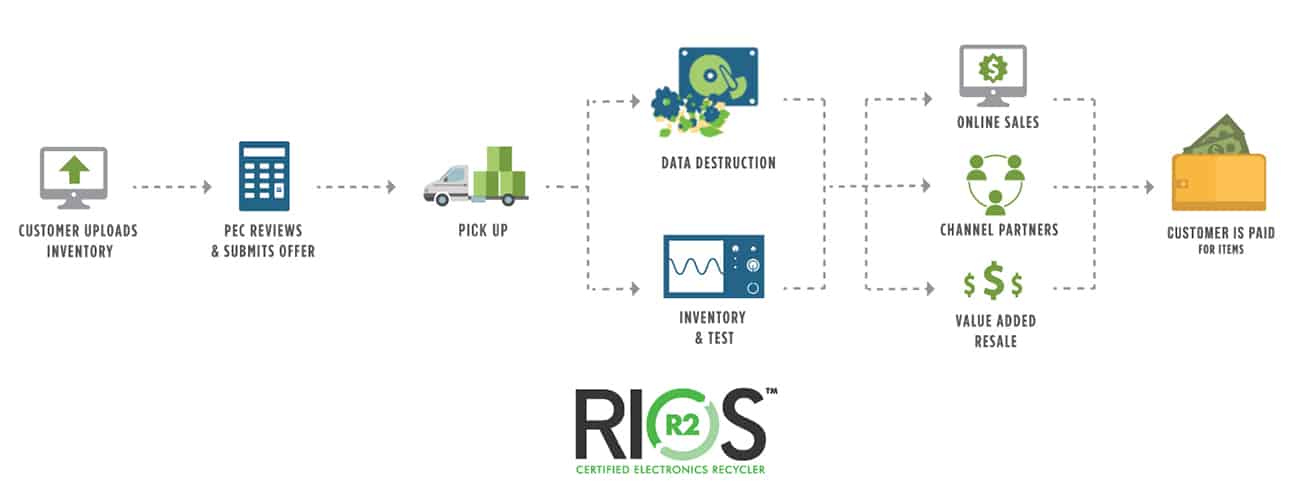IT Asset Disposition And Recycling
What Is IT Asset Disposition (ITAD)?
Information Technology Asset Disposition (ITAD) refers to the discarding of IT assets that have become obsolete or are no longer working. Given the hazardous and toxic materials often found in electronic equipment, it is important that the disposal of these end-of-life devices is done in an environmentally responsible manner.
In addition, most of the obsolete storage devices will have contained sensitive information and that needs to be thoroughly erased, possibly including the physical destruction of the hard drives. Needless to say, the disposal should also be done in a way that salvages as many components as possible, as well as limiting the potential for environmental damage.
The term “IT assets” can be used to mean anything from laptops and desktop computers to large, industrial quality data storage devices and associated hardware from data centers. Data center equipment can present challenges in its removal as the data destruction phase is usually the last step in a co-ordinated decommissioning process. The data center manager will want to know the answers to numerous questions, including:
- How the devices will be removed;
- At which stage the data will be destroyed;
- How the data will be destroyed;
- How the components will be reused or recycled;
- How any hazardous waste will be handled; and
- What value will be recovered and paid to the data center?

ITAD Services Company
Because of the complications involved in the ITAD process, the preferred solution to the disposing of obsolete IT assets is to use the services of a specialist ITAD services company, such as Potomac eCycle. They can handle any volume of equipment from a few laptops to a complete company update involving hundreds of machines, or the clearance of a data center. They can carry out the data destruction on-site or in their purpose-built facility. They also provide a certificate of destruction, together with a complete chain-of-custody account, if required.
Most medium-sized and large organizations will have a defined policy and standard operating procedure for the disposal of their old equipment. That procedure will include instructions for the oversight of the outsourcing of the disposal and destruction of old technology equipment.
When considering the best ITAD solution there are three primary issues to take into account:
- The security of the process, including data destruction;
- The maximization of any value to be realized; and
- Compliance with any security regulations.
There is also the issue of minimizing the environmental impact of the disposal process.

Certification Of Data Destruction
In assuring that all data is destroyed to the point where it cannot be recovered, even with advanced forensic technologies the following process will typically be applied:
- Removal of all corporate and personal identification;
- Erasure and shredding of the hard drives;
- Documentation of the chain-of-custody; and
- Certification of the completion of the data destruction process.
These steps ensure that sensitive, confidential information, whether personal or corporate adequately protected and prevented from passing into the wrong hands. With concerns about identity theft and industrial espionage, it is critically important that all possible precautions are taken to eliminate the possibility of the misuse of data.
Effective Electronics Recycling
A professional ITAD services company will ensure that it always works in compliance with all relevant regulations, at all levels and that all of its employees work in accordance with industry best practices.
These include:
- Working within R2/RIOS procedures;
- Tracking equipment by serial numbers and tags;
- Reconciling inventory;
- Monitoring downstream processors of hazardous waste; and
- Minimizing waste going into landfills.
R2/RIOS Standards And Compliance
RIOS stands for the Recycling Industry Operating Standard. This standard was developed by the International Organization for Standardization (ISO) a body made up of representatives from various national standards organizations to promote worldwide standards. RIOS standards primarily cover quality and environmental management.
The electronics industry has developed its own certification for the responsible disposal of electronic waste, including management oversight and best data destruction practices. Companies meeting or exceeding these standards are referred to as R2-certified.
The Institute of Scrap Recycling Industries (ISRI) combines the RIOS and R2 to offer an R2/RIOS certification, the highest qualification in the electronics recycling industry. This is recognized by various bodies including the EPA (Environmental Protection Agency). Potomac eCycle is R2/RIOS-certified.
How Important Is ITAD In Data Security?
The last few years have seen an escalation in data breaches with companies such as Equifax, Dunkin’ Donuts, Advent Health, and Dow Jones reporting that their systems had been compromised. In most cases, these attacks were on live systems but the principle of securing sensitive data applies equally to end-of-life electronic equipment and its disposal process.
When any computer equipment has to be decommissioned, the security of any data must be assured. It is not sufficient to wipe the disks with software programs, or even to reformat the drives: in both of those situations the data can be rebuilt and recovered, even if the space has been overwritten numerous times with random data. For these reasons, the ITAD process should be viewed from the point of view of data security first and foremost.
The R2/RIOS certification provides assurance that the data destruction will be carried out professionally and in accordance with industry best practices.
